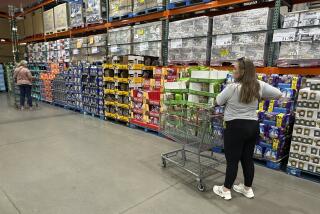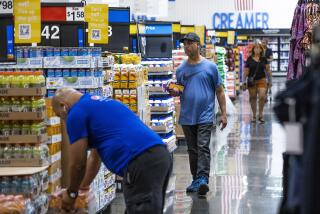Consumer Confidence Index Rises Despite Energy Costs
- Share via
WASHINGTON — An abundance of jobs helped push consumer confidence higher this month, but the optimism could be short-lived as the pain at the gasoline pump becomes more acute.
Soaring energy prices may also be starting to harm manufacturers as the Commerce Department reported Tuesday that factory orders in July fell by the largest amount in 15 months.
Energy costs, already at record levels, are being driven even higher after Hurricane Katrina’s devastating strike along the Gulf Coast.
The concern is that surging energy costs will at some point cause consumer confidence to falter, resulting in a cutback in consumer spending, which accounts for two-thirds of total economic activity.
However, the Conference Board reported Tuesday that consumers remained optimistic in August despite the surge in energy costs. The board’s index rose to 105.6, up from a revised 103.6 in July.
Analysts said that strong job growth was offsetting the surge in energy costs.
“It may be hot and energy prices may be scorching consumers, but as long as jobs are available, people seem to be happy,” said Joel Naroff, head of Naroff Economic Advisors, a Holland, Pa., forecasting firm.
Naroff and other economists said it was an open question how long the economy could stand up to a relentless rise in energy prices that has socked motorists during the summer driving season. It is expected to do further damage with winter heating bills.
“Because the economy is strong and job growth is strong, the consumer has not felt much pain, but that is likely to change in the next few months,” said Nariman Behravesh, chief economist at Global Insight, an economic consulting firm in Lexington, Mass. “I think we are headed for a period of economic weakness mostly related to the oil situation.”
Although economists believe the economy is powering ahead at a rate above 4% in the current July-September quarter, Behravesh said that could slow dramatically to around 2.5% in the final three months of this year, reflecting the drag from higher energy costs.
Separately, the Commerce Department reported Tuesday that orders to U.S. factories fell by 1.9% in July, the biggest drop since a similar decline in April 2004.
Some economists attributed part of that weakness to rising concerns by businesses about how strong demand will remain given this year’s surge in energy prices.
Still, economists said the economy’s huge head of steam heading into the final months of the year should be enough to keep the country out of a recession.
More to Read
Inside the business of entertainment
The Wide Shot brings you news, analysis and insights on everything from streaming wars to production — and what it all means for the future.
You may occasionally receive promotional content from the Los Angeles Times.










